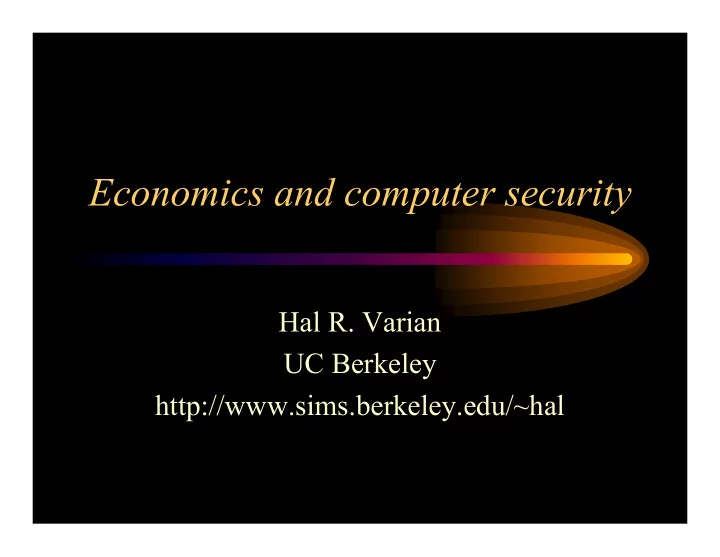

Economics and computer security Hal R. Varian UC Berkeley http://www.sims.berkeley.edu/~hal
Outline • Assignment of liability • Role of insurance • Efficiency and coordination costs • Implications of weakest link technology 11/16/2005 2
Assignment of liability • Want to reduce expected cost of accidents – Parties can affect the probability of accidents happening – Want to set up incentives to get the right parties invest effort in reducing expected costs of accidents – Liability: who has to pay and how much if accident occurs. Sets incentives to reduce expected costs. • Basic principles – Least cost avoider: assign liability to the party that is best positioned to reduce expected costs – Due care standard: set a due care standard, no liability if you meet the due care standard, otherwise pay accident cost 11/16/2005 3
Least cost avoider • ECost = Prob(e1+e2) A – c1 e1 – c2 e2 – ECost = expected cost – Prob(e1+e2) = prob accident occurs – A = cost of accident/event – e1, e2 = effort to reduce prob of accident – c1, c2 = cost of effort • Observe: you want the party with the lowest effort cost to exert all the effort • This drives the other party’s effort to zero, but that’s OK in this case 11/16/2005 4
Due care standard • EC = Prob(e1,e2) A – c1 e1 – c2 e2 – Find efforts that minimize expected costs, (e1*,e2*) – Set due care standards equal to this effort level – No liability if you meet due care standard – Otherwise, pay fine equal to cost A if accident occurs – See Steven Shavell, Economic Analysis of Accident Law 11/16/2005 5
Computer security • Sometimes the effort cost is so extreme (e.g., technical knowledge) that liability goes to one party • Other times due care standard is plausible – Due care standard determined by courts, but guided by industry practices – Could be very important role for security community – Better to be proactive than just let these standards evolve – Should there be a FASB-like board? 11/16/2005 6
Example: ATM machines • Ross Anderson: “Why cryptosystems fail” • Suppose there is a dispute between you and your bank about your ATM usage – England: bank is right unless you can prove them wrong – US: you are right unless the bank can prove you wrong • Two different default assignments of liability 11/16/2005 7
Result of ATM liability assignment • US: banks invest in risk reduction technology • England: banks typically do not invest in such technology • Credit card and phone card risk management • Role of competition: debit cards 11/16/2005 8
Role of insurance • Two major risk management institutions – Stock market – Insurance market • Why do corporations buy insurance? – Value of shares depend on portfolio value – Shareholders can diversify risk themselves – Particularly good question in case of computer security 11/16/2005 9
Why do corporations buy insurance? • Answer: risk management services • Insurance companies are well placed to – recommend actions – require compliance – disseminate best practices – insurance contract is incentive compatible! • Especially valuable services for rare events 11/16/2005 10
Examples • Expert certification – Year 2000 problem • Could do more – CERT patches requirement for insurance – SATAN test • Prediction – insurance companies will move into computer security (supplemented by expert advisors) 11/16/2005 11
Insurance: moral hazard • Want the insured to bear some risk – full insurance has bad incentives – deductible/co-pay is much better • Want to structure incentives to reduce risk – liability assignments – as discussed – deductible – moral hazard 11/16/2005 12
Adverse selection • Those who need insurance most buy it • Pool that purchases insurance is not representative of entire population • Adverse selection can destroy market – argument for social insurance – e.g., infrastructure protection above and beyond that covered by private incentives 11/16/2005 13
Infrastructure as public good • Private good v public good – excludability – rivalry • Public good aspect to security – national defense ; police services • How to pay for security? – individual or social choice? 11/16/2005 14
Private or public? • Gated communities or private walls? 11/16/2005 15
Costs • Production costs – economies of scale in protection? • Countervailing effects – decision costs: social v private decisions – coordination/complexity management costs – effectiveness of measures – clarity of who is responsible – genetic diversity 11/16/2005 16
Total effort v weakest link • Public goods usually involve total effort • Security often has weakest-link character – makes public good more costly – private incentives • leadership is critical • coordination is critical 11/16/2005 17
Why systems fail? • Ross Anderson paper “Why cryptosystems fail” – http://www.cl.cam.ac.uk/~rja14 • What to do about human failure? – get incentives right (e.g., liability assignments) – outside monitors and auditors (insurance) – follow procedures (banking) – standards setting role of military (e.g., aviation) 11/16/2005 18
Recommend
More recommend